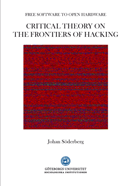Johan Söderberg: Free Software to Open Hardware: Critical Theory on the Frontiers of Hacking (2011)
Filed under thesis | Tags: · critical theory, critique, floss, free software, hacking, hardware, open hardware, software, technology

Starting from the experiences of hackers developing free software and open hardware, this thesis addresses some key and recurrent themes in the field of Science and Technology Studies (STS). It poses the question: how are technologies conceptualised, constructed and used in ways that render some aspects of them transparent, while leaving others opaque? This question is complicated by the fact that what is visible and transparent to some will remain opaque to others, depending on the level of technical expertise commanded. The political implications of this stand at the heart of my inquiry. Since technical know-how is unevenly distributed among groups in society, the same concern can be rephrased as follows: How are relations of power and conflict mediated through technology and relations of technical expertise/ignorance? While trying to address this question, the thesis delves into matters of epistemology. Just as programming skills are required for seeing what is going on behind the computer screen, so theoretically informed reflection can be considered necessary for rendering visible social relations not immediately apparent to the casual eye. Discussion of the actions of hackers is therefore combined in this thesis with discussion of the alternative programmes of research which can be applied to the study of these actions. Two programmes of research in particular receive attention: the critical theory of technology and constructivist science and technology studies (STS). Of these two, the relevance of the former tradition is emphasized and its value for research in the STS field defended. The thesis is composed of four articles and an introductory chapter summarizing and encapsulating my concerns. The first article discusses belief in technological determinism among hackers and how this does not necessarily stand in opposition to political engagement. On the contrary, it is common within hacker politics for contending viewpoints to be articulated in relation to seemingly apolitical narratives about technical neutrality and progress. The second article also deals with antagonistic relations at the heart of processes of technological change. It argues that the punitive actions of law enforcement agencies provide a clear indication of the presence of asymmetrical power relations in technological change through, for example, attempts to suppress filesharing inventions. Hackers are negotiating with legal authorities and the mass media, but also amongst themselves, about how to draw the line between the legitimate users and harmful misusers of technology. The third and fourth articles are based on a case study of a group of Czech hardware hackers who invented a wireless network technology for sending data with visible, red light. The challenges faced by these hardware hackers in their attempts to design technical solutions capable of being built by non-expert users are discussed at length in a theoretically-informed fashion.
PhD thesis
University of Gothenburg, Department of Sociology, March 2011
ISSN: 1650-4437
ISBN: 978-91-975442-7-6
68 pages
Creative Commons: Attribution-ShareAlike
Johan Söderberg: Hacking Capitalism. The Free and Open Source Software Movement (2007)
Filed under book | Tags: · capitalism, filesharing, floss, free software, gift economy, hacker culture, hacking, intellectual property, open source, software

The Free and Open Source Software (FOSS) movement demonstrates how labour can self-organise production, and, as is shown by the free operating system GNU/Linux, even compete with some of the worlds largest firms. The book examines the hopes of such thinkers as Friedrich Schiller, Karl Marx, Herbert Marcuse and Antonio Negri, in the light of the recent achievements of the hacker movement. This book is the first to examine a different kind of political activism that consists in the development of technology from below.
Publisher Routledge, 2007
Volume 9 of Routledge research in information technology and society
ISBN 0415955432, 9780415955430
252 pages
PDF (updated on 2016-1-16)
Comments (3)John Biggs: Black Hat: Misfits, Criminals, and Scammers in the Internet Age (2004)
Filed under book | Tags: · hacker culture, hacking, internet, software, spam, spyware, virus

Homes are becoming increasingly wired and, thanks to Wi-Fi, unwired. Hackers can strike quickly and create disastrous results! These stories and follow-ups are a fascinating insight into the modern threats we all face in the techno jungle. Written by internationally recognized author, John Biggs, this book is an ideal read for anyone who owns a computerand has ever pondered the threats of modern technology.
Black Hat takes a fair and thorough look at the hacking cases that have made the news in recent years. These stories include all the juicy details, like the people behind the hacking, as well as legislative attempts to curtail hacking, cracking, and spam.
Publisher Apress, 2004
Business Series
ISBN 1590593790, 9781590593790
158 pages

